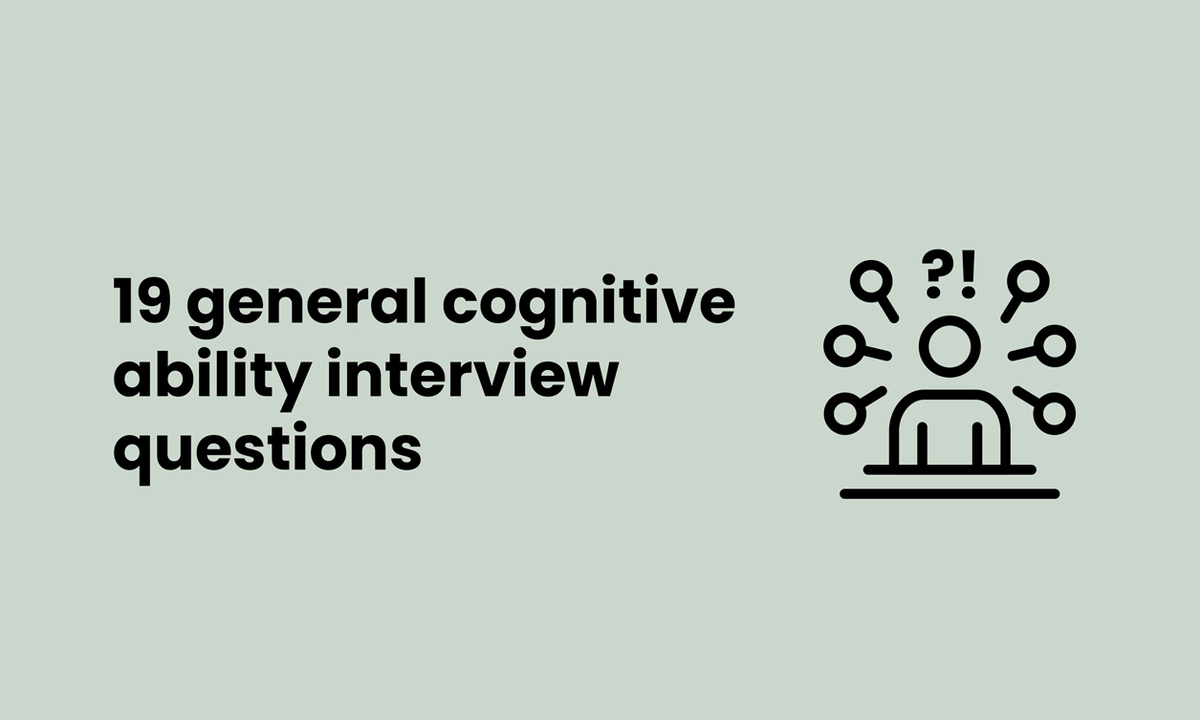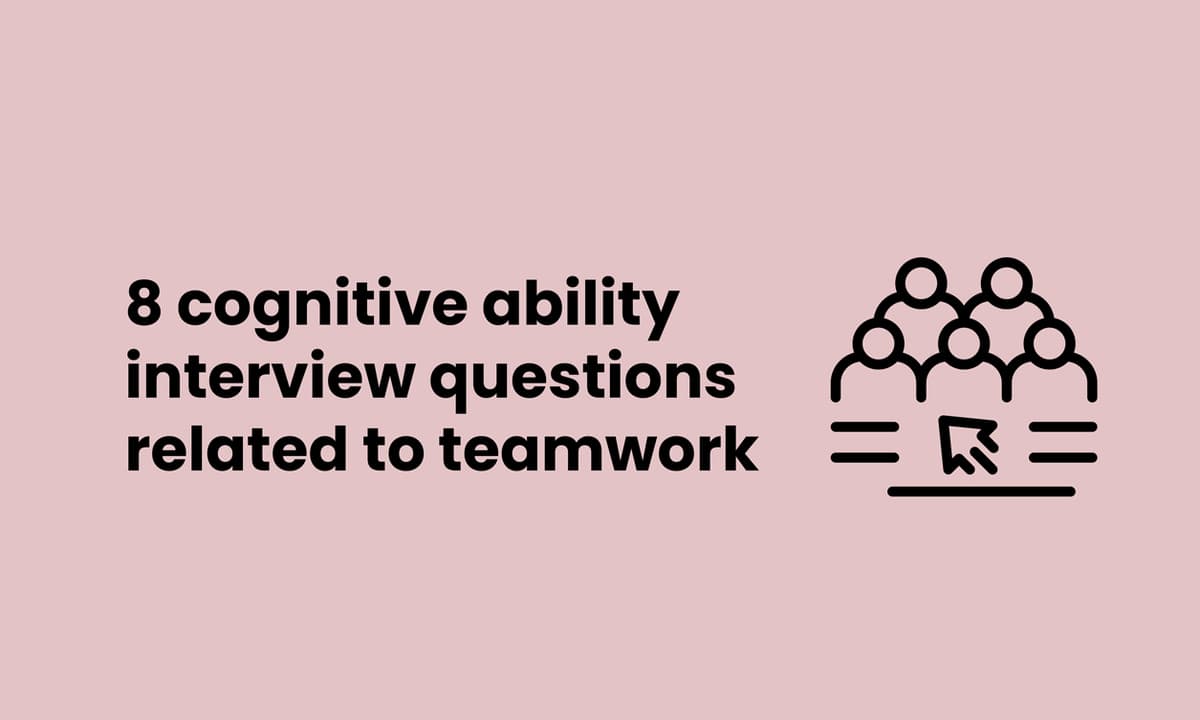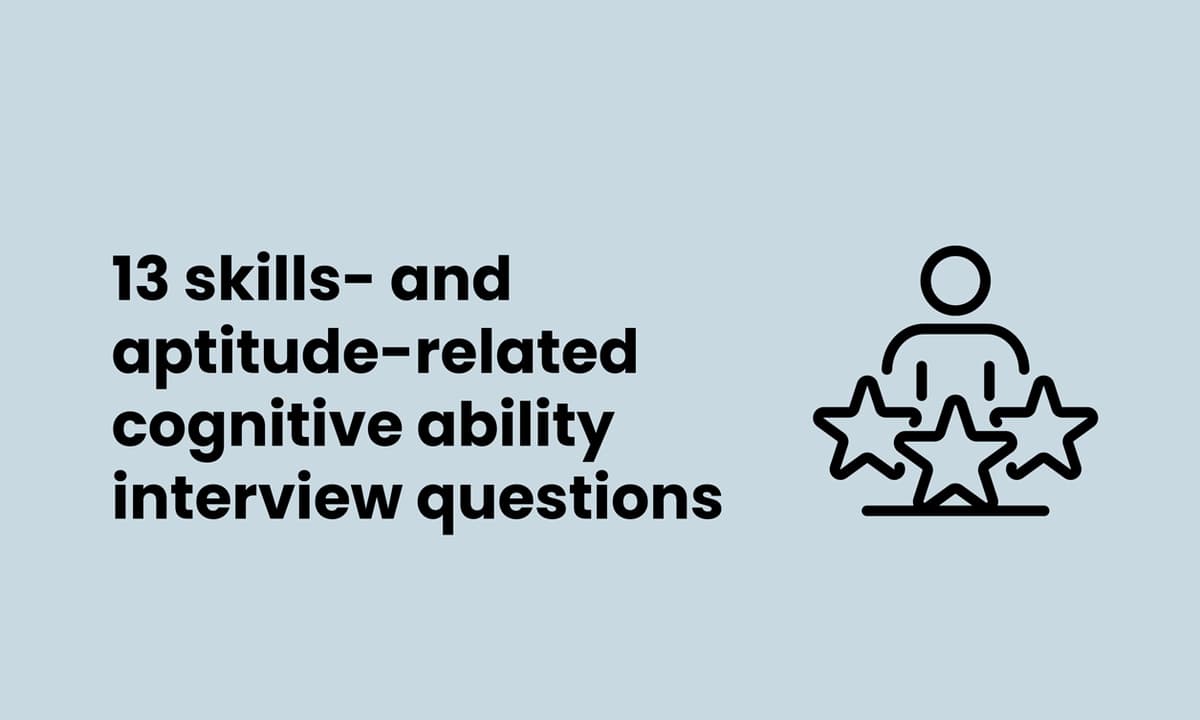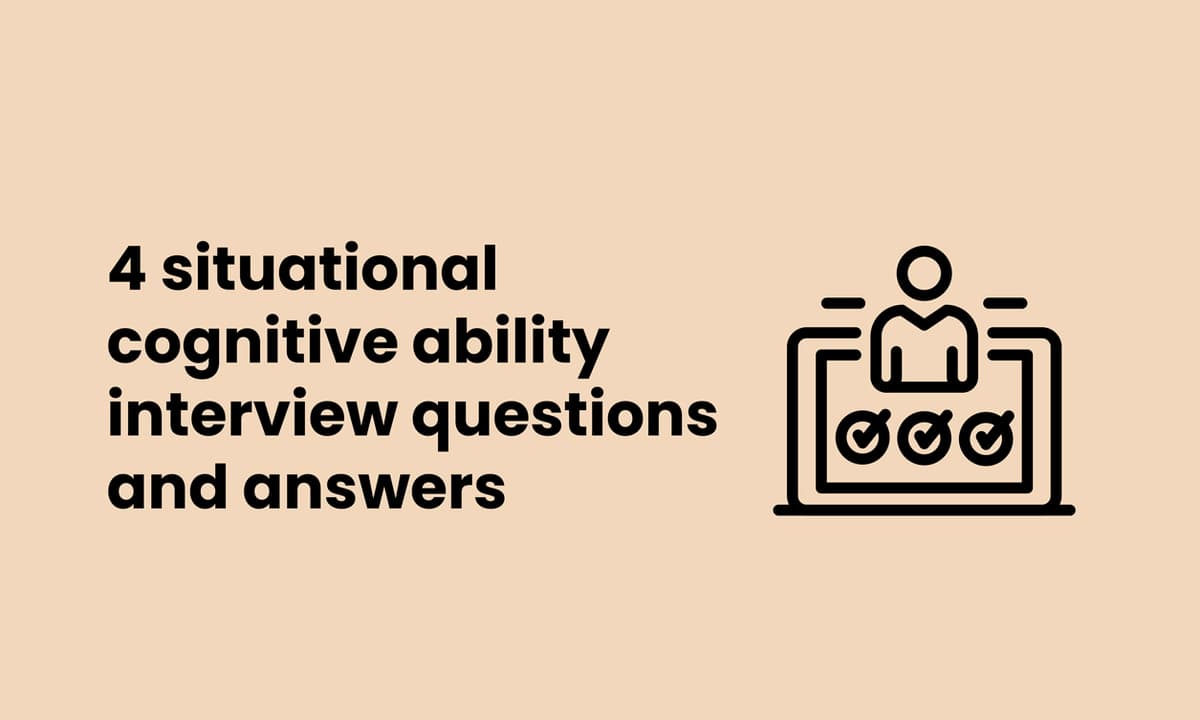44 cognitive ability interview questions
Before you hire a candidate, it’s critical that you find out if their cognitive skills are sharp enough to complete complex tasks for your organization.
Being thorough when evaluating your applicants’ cognitive skills is essential but it can also be a challenge. That’s why we recommend using skills tests first, and then conducting interviews to gain an in-depth understanding of their capacities.
If you want to reduce the prep work required for your interviews, this article is for you. In it, you’ll find 44 cognitive ability interview questions to evaluate your applicants’ skills.
Table of contents
- 19 general cognitive ability interview questions
- 5 general cognitive ability interview questions and answers
- 8 cognitive ability interview questions related to teamwork
- 5 cognitive ability interview questions and answers related to teamwork
- 13 skills- and aptitude-related cognitive ability interview questions
- 5 skills- and aptitude-related cognitive ability interview questions and answers
- 4 situational cognitive ability interview questions and answers
- At which stage should you use cognitive ability interview questions?
- Assess applicants’ cognitive skills with cognitive ability interview questions
19 general cognitive ability interview questions
Being able to accurately assess your candidates’ cognitive abilities is essential when hiring. Ask applicants these 19 general cognitive ability interview questions to learn more about their skills.
Which challenges are you looking forward to solving with our organization?
Have you taken any courses that have enhanced your cognitive skills?
How do your cognitive skills make you the best fit for this open role?
What is your greatest achievement career-wise, and how did your cognitive skills help you accomplish it?
What has been your most rewarding work-related project? Why?
What has been your least rewarding work-related project? Why?
Describe your experience and milestones in your career so far.
What do you recall from the first round of interviews with our organization?
Which work event is the most memorable to you? Describe the event.
Describe a time when you had to incorporate feedback into your work process using cognitive skills.
What have you learned about our organization?
What would you improve about our organization?
Which three words would you use to describe your cognitive skills?
What do you hope to achieve in three years?
How would you adapt to change using cognitive skills in the workplace?
How would you learn how to use new technology in this role?
Which skills do you use to cope with stressful situations?
Which cognitive skills do you use to meet deadlines?
How did you get accustomed to your previous role?
5 general cognitive ability interview questions and answers
Here are five of the general cognitive ability interview questions above, along with sample answers you can use to assess your candidates’ responses.
1. Which cognitive skills do you use to meet deadlines?
When meeting deadlines, applicants may use several cognitive skills such as problem-solving and critical-thinking skills. Applicants should be able to give an example of how their cognitive ability skills helped them to meet a specific deadline.
For instance, they may explain that they broke down a complex content writing project into smaller challenges to write the content before the deadline using problem-solving skills.
2. Describe a time when you had to incorporate feedback into your work processes using cognitive skills.
Feedback can be difficult to incorporate, but candidates should know how to achieve it with the right cognitive skills. Applicants may explain that their communication and critical thinking skills helped them to understand the feedback and use it to improve for future projects.
3. Which skills do you use to cope with stressful situations?
Can your candidates draw upon their cognitive skills to handle stressful situations? Your applicants may mention that cognitive sub-skills such as collaboration, interpersonal skills, or communication skills make it easier to handle stressful situations and get support for complex projects from team members.
4. How did you get accustomed to your previous role?
Interpersonal skills are an important cognitive sub-skill that applicants may mention when answering this question. Your applicants may mention that asking team members for advice and building strong relationships with them helped them get accustomed to their previous roles.
5. What do you hope to achieve in three years?
Applicants should aspire to continue on an upward career trajectory with your organization, using their existing skills to advance and learn new skills.
The best insights on HR and recruitment, delivered to your inbox.
Biweekly updates. No spam. Unsubscribe any time.
8 cognitive ability interview questions related to teamwork
It is critical to understand how your applicants use their cognitive abilities to work as part of a team. Ask your candidates these cognitive ability interview questions related to teamwork to learn more about this.
Have you ever had to motivate other team members? Which strategies did you use?
Why is team collaboration important to you? Which cognitive skills help you to work well with others?
Have you ever led a team? Which cognitive skills helped you to delegate and distribute tasks?
How well do you work with team members who have different cognitive backgrounds?
Have you ever mediated a conflict between team members?
Would you prefer to work as part of a team or individually?
Describe a situation where a co-worker disagreed with you. Which cognitive skills did you use to resolve this?
Have you ever mentored a new hire? Which cognitive skills helped you through the process?
5 cognitive ability interview questions and answers related to teamwork
Here are five of the above cognitive ability interview questions about teamwork, plus sample answers you should listen for in the interview.
1. Have you ever mentored a new hire? Which cognitive skills helped you through the process?
Employees’ cognitive skills can be crucial when they mentor new hires. Do your applicants have the right problem-solving, interpersonal, and critical-thinking skills to assist new hires and help them get accustomed to a new role?
For example, an engineering manager may need to use critical thinking skills to remove blockers when mentoring and supporting new hires.
2. Have you ever had to motivate other team members? Which strategies did you use?
Applicants should know that interpersonal skills can help them motivate team members, as can problem-solving skills. Can your candidates give an example of how these two cognitive ability sub-skills helped them encourage and support a team member during a difficult project or task?
For instance, a lead peer code reviewer may need to use interpersonal skills to motivate team members when looking for mistakes.
3. Why is team collaboration important to you? Which cognitive skills help you to collaborate within teams?
Team collaboration is vital for most roles. Applicants should have no problems explaining how they collaborate with teams using communication skills and active listening to assist team members and receive the right support.
For example, in a sales team, applicants must be able to collaborate with others to roll out new sales strategies.
4. How well do you work with team members who have different cognitive backgrounds?
Working within diverse teams means accommodating unique ways of thinking. Can your applicants provide an example of how their active listening and interpersonal skills helped them acknowledge and embrace the contributions of team members who have different cognitive backgrounds from them?
5. Would you prefer to work as part of a team or individually?
When responding to this cognitive ability interview question, applicants may mention that it depends on the project or task they need to complete.
For instance, if they need to brainstorm ideas, they may prefer working as a team and using communication skills to interact with team members. Working independently may be their preferred choice if they need to focus on an individual task.
13 skills- and aptitude-related cognitive ability interview questions
Your applicants’ cognitive skills are made up of several other skills. Ask your candidates these 13 cognitive ability interview questions related to other essential skills to learn about them.
What are your best cognitive skills?
What are your worst cognitive skills, and how are you improving them?
How would your manager rate your critical thinking skills?
How would you rate your problem-solving skills?
How would your manager rate your ability to understand instructions?
How would you rate your numerical reasoning skills?
How would your manager rate your interpersonal skills?
How would you rate your math skills?
How would your manager rate your analytical skills?
How would you rate your interpersonal skills?
How would your manager rate your attention to detail?
Which rating would you give your reading comprehension skills?
Which soft skills do you use alongside cognitive skills to complete complex projects?
5 skills- and aptitude-related cognitive ability interview questions and answers
1. How would your manager rate your critical thinking skills?
Critical thinking skills are a vital cognitive sub-skill. Ask applicants this question to get an in-depth understanding of their critical thinking skills. Your candidates should be comfortable providing an example of how their critical thinking skills match their manager’s rating.
For instance, a copywriter may need to use critical thinking skills to acknowledge the layout of a given webpage and fit the copy into designated spaces.
2. How would you rate your problem-solving skills?
Since many challenges require exceptional problem-solving skills, you need an applicant who has excellent skills in this area. Can your applicants give you an example of how their problem-solving skills have helped them in the past?
For example, a receptionist may need to book an appointment and acknowledge the patient’s requirements and the doctor’s schedule. Does their example match the rating they have given themselves?
3. How would your manager rate your ability to follow instructions?
Following instructions is a critical cognitive sub-skill. Are your applicants able to demonstrate with an example that they can follow instructions well? For instance, they may be capable of following a brief for a content writing task, but can they provide an example of a project that was a success thanks to this skill?
4. How would your manager rate your attention to detail?
How advanced is your applicant’s attention to detail? This cognitive sub-skill is vital for completing projects and avoiding mistakes. Can your applicants show that they have excellent attention to detail skills that match your role’s requirements?
5. How would your manager rate your analytical skills?
Analytical skills can help applicants make sound judgments and handle projects efficiently. Do they have the required analytical skills required for your open role? Does the example they provide align with their manager’s rating?
4 situational cognitive ability interview questions and answers
How do your applicants use their cognitive abilities in challenging work-related situations?
Ask them these four situational cognitive ability interview questions to learn more about their situational judgment skills and use the sample answers below as a guide to assess their responses.
1. When was the last time you had to think on your feet to solve a problem?
Applicants with exceptional cognitive skills should be capable of thinking spontaneously to solve problems. Can your applicants describe a situation where they used their cognitive skills to consider all angles of a complex problem?
2. Have you ever lacked confidence at work? Describe the situation and tell us how you overcame it.
Challenging work-related situations can knock down an employee’s confidence. Do your applicants have the right cognitive skills to help them develop confidence and overcome such challenges?
3. Have you ever made an error or missed a deadline at work? Describe how you corrected the error using cognitive skills and critical thinking.
Your applicants may have made mistakes at work, but the important thing is whether they learned from them. Ask candidates this question to evaluate their skills to tackle challenging situations and learn how their cognitive skills helped them to rectify the error.
4. Describe a time when you led an initiative or innovative idea.
Being innovative is a useful skill for organizations across the world. Do your applicants have the right cognitive skills to think of innovative ideas? Can they describe a situation when their cognitive skills increased productivity or contributed to a useful solution?
At which stage should you use cognitive ability interview questions?
We advise that you use these cognitive ability interview questions only after your applicants have completed their skills assessment and have demonstrated they have the necessary skills for your open role.
In other words, after the skills assessment stage, conduct interviews with your best applicants and use the cognitive ability interview questions from this article to learn more about their qualities.
Using this method will guarantee a faster time-to-hire and eliminate the need for tedious resume screening, as skills assessments will help you identify and hire top talent faster.
Assess applicants’ cognitive skills with cognitive ability interview questions
Despite the difficulties you may face when assessing your applicants’ cognitive skills, don’t forget that you have skills assessment platforms like TestGorilla to assist you from the very start of the hiring process.
After the skills assessment process, all you need to do is invite your most talented applicants to an interview and use the cognitive ability interview questions listed in this article to gain an in-depth understanding of their skills and experience.
Evaluate your applicants using our cognitive ability interview questions and hire top talent to help you accomplish your goals.
With TestGorilla, you’ll find the recruitment process to be simpler, faster, and much more effective. Get started for free today and start making better hiring decisions, faster and bias-free.
You've scrolled this far
Why not try TestGorilla for free, and see what happens when you put skills first.


















